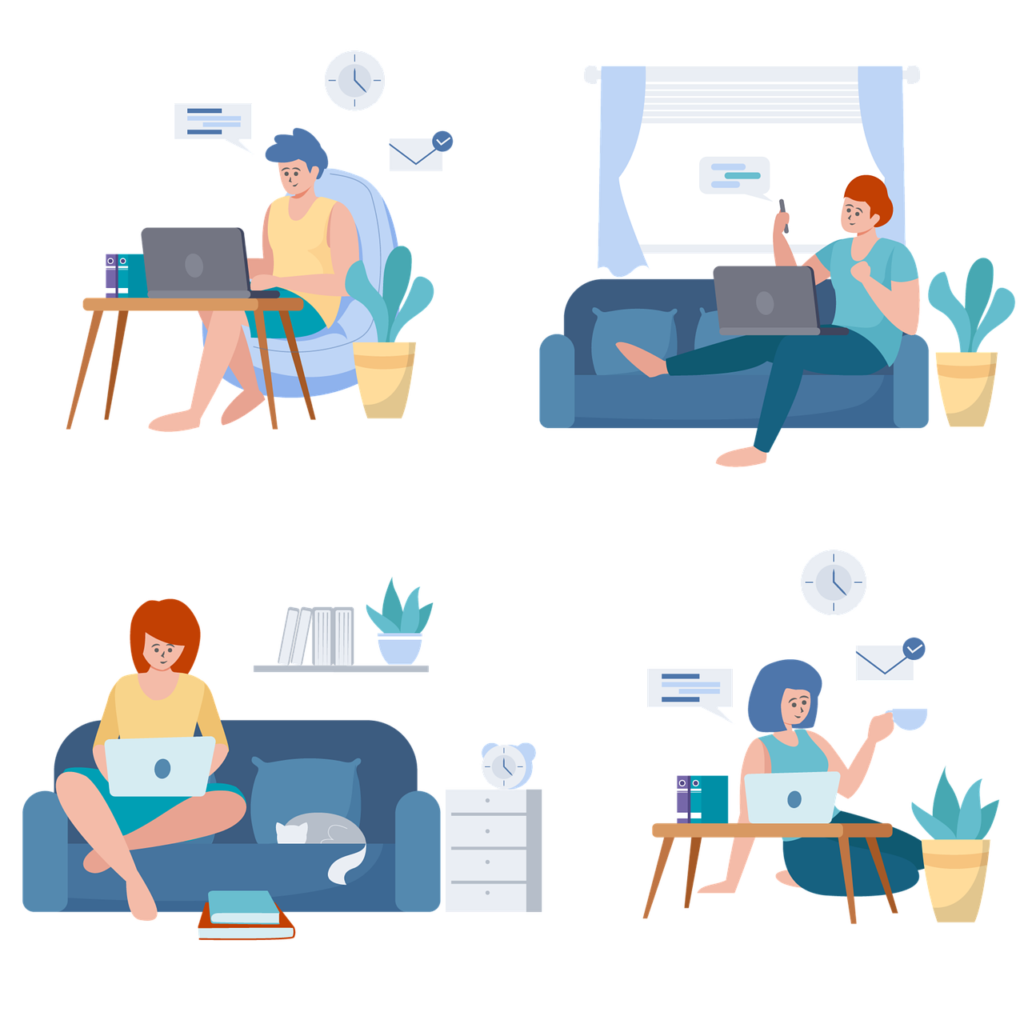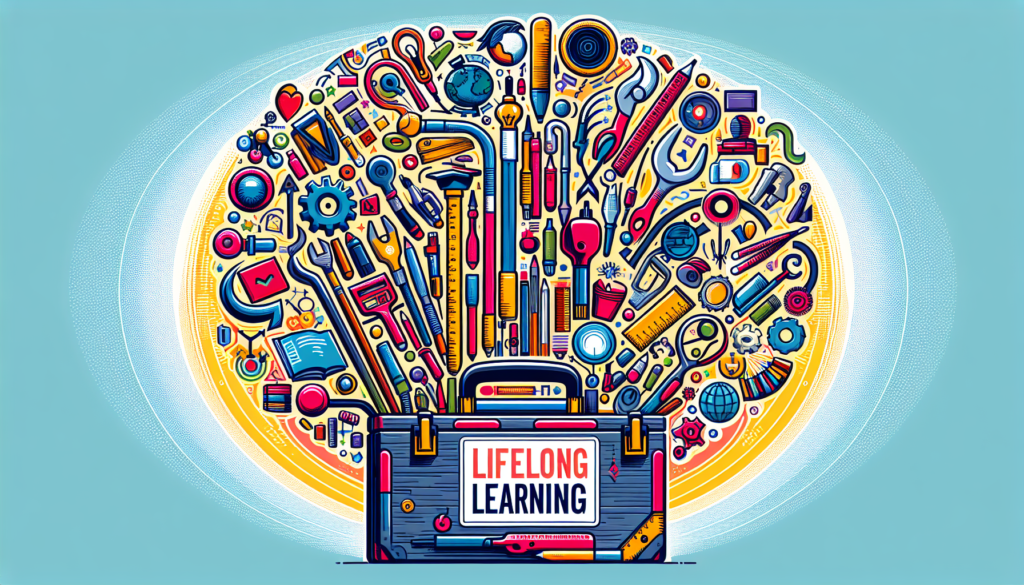In today’s competitive job market, constantly evolving skills and a willingness to learn are essential. Lifelong learning, with its focus on continuous personal and professional development, has become a secret weapon for individuals seeking to stay relevant and stand out in their careers. By embracing lifelong learning, you not only expand your knowledge and expertise, but also demonstrate to employers your adaptability and commitment to growth. This article explores the importance of lifelong learning in the job market, highlighting how it can be a game-changer for your career success. So, buckle up and get ready to unlock the power of lifelong learning!

The Importance of Lifelong Learning
In today’s fast-paced and ever-changing world, the concept of lifelong learning has become more important than ever before. Embracing a mindset of continuous growth and development is essential for individuals who want to thrive in their personal and professional lives. Lifelong learning empowers you to adapt to rapidly changing industries, stay relevant in the job market, and seize new opportunities that come your way.
Continuous Growth and Development
Lifelong learning is all about embracing a growth mindset and committing to the pursuit of knowledge and self-improvement throughout your life. It goes beyond acquiring a formal education and instead focuses on continuous growth and development in all areas of life. Whether it’s learning new skills, expanding your knowledge base, or developing your personal interests, lifelong learning is key to unlocking your full potential.
Adapting to Rapidly Changing Industries
Industries and job requirements are constantly evolving due to advancements in technology, changing market trends, and the emergence of new industries altogether. In order to keep up with these changes, it is crucial for professionals to continuously update their skills and knowledge. Lifelong learning allows you to adapt and thrive in the face of these rapid transformations, ensuring that you remain competitive and valuable in the job market.
Staying Relevant in the Job Market
In today’s highly competitive job market, it is not enough to rely solely on past qualifications and experience. Employers are increasingly seeking candidates who demonstrate a commitment to lifelong learning. By continuously acquiring new skills and knowledge, you can stay ahead of the curve and demonstrate to potential employers that you are adaptable, motivated, and eager to learn. Lifelong learning is your secret weapon in standing out from the crowd and staying relevant in today’s job market.
Advantages of Lifelong Learning
Embracing lifelong learning comes with a wide range of advantages that can greatly enhance your personal and professional life. By continuously expanding your skillset and knowledge base, you not only increase your employability but also improve your job performance and efficiency.
Enhanced Skillset and Knowledge Base
One of the most obvious advantages of lifelong learning is the continuous enhancement of your skillset and knowledge base. By engaging in various learning activities, such as attending workshops, taking courses, or participating in webinars, you can acquire new skills and expertise in areas that are relevant to your career. This not only makes you more valuable to current and potential employers but also opens doors to new opportunities.
Increased Employability
Employers today are looking for candidates who possess a diverse range of skills and are adaptable to changing circumstances. Lifelong learning helps you increase your employability by demonstrating your commitment to personal growth and development. It shows employers that you are willing to go the extra mile to acquire the skills and knowledge needed to excel in your field.
Improved Job Performance and Efficiency
Lifelong learning doesn’t just benefit you professionally; it also has a direct impact on your job performance and efficiency. As you continuously update your knowledge and skills, you become better equipped to tackle challenges and solve problems in your job. This not only increases your productivity but also allows you to perform at a higher level, leading to increased job satisfaction and potential for career advancement.
Developing a Lifelong Learning Mindset
Developing a lifelong learning mindset is the foundation for unlocking the benefits of continuous growth and development. It involves recognizing the need for lifelong learning, identifying personal interests and goals, and creating a learning plan that aligns with your aspirations.
Recognizing the Need for Lifelong Learning
The first step towards developing a lifelong learning mindset is recognizing the importance of it in your personal and professional life. Understand that learning should not be confined to your formal education but should be a lifelong pursuit. Embrace the fact that there is always something new to learn and that acquiring new knowledge and skills can bring about personal growth and enhance your career prospects.
Identifying Personal Interests and Goals
In order to make lifelong learning a meaningful and enjoyable experience, it’s important to identify your personal interests and goals. What topics or skills spark your curiosity? What are your long-term aspirations? By aligning your learning journey with your passions and ambitions, you’re more likely to stay motivated and engaged throughout the process.
Creating a Learning Plan
Once you have identified your personal interests and goals, it’s time to create a learning plan. Break down your goals into smaller, achievable steps and determine the learning methods that work best for you. Whether it’s enrolling in formal education programs, taking online courses, attending workshops, or engaging in self-study, find the approach that suits your learning style and resources. A well-structured learning plan will guide you on your lifelong learning journey and help you stay focused on your goals.
Methods of Lifelong Learning
Lifelong learning can take many forms, and it’s important to explore different methods that cater to your unique learning style and preferences. From formal education to online courses, professional development programs to reading and research, and networking to collaborating, here are some of the most effective methods of lifelong learning.
Formal Education
Formal education, such as pursuing a degree or diploma from a recognized educational institution, is a traditional yet effective method of lifelong learning. It provides a structured curriculum and opportunities for in-depth learning in specific fields of study. Formal education can help you acquire foundational knowledge and skills that serve as a solid base for further learning and advancement.
Online Courses and Webinars
In recent years, online learning platforms and webinars have gained immense popularity as convenient and accessible avenues for lifelong learning. These platforms offer a wide range of courses and webinars on various topics, allowing you to learn at your own pace and from the comfort of your home. Online learning provides flexibility and the opportunity to acquire new skills or delve deeper into areas of interest.
Professional Development Programs
Professional development programs are specifically designed to enhance the skills and knowledge of individuals in a particular industry or profession. These programs often include workshops, seminars, conferences, or training sessions that focus on areas of professional growth. By actively participating in these programs, you can stay up to date with industry trends, network with peers, and gain valuable insights from experts in your field.
Reading and Research
Reading books, articles, and research papers is a timeless method of lifelong learning. It allows you to explore new ideas, gain insights from diverse perspectives, and stay informed about the latest developments in your field. Whether it’s physical books, e-books, or academic journals, reading and research broaden your horizons and deepen your understanding of various subjects.
Networking and Collaborating
Networking and collaborating with fellow professionals, experts, and mentors can be an invaluable source of learning. By engaging in meaningful conversations, sharing experiences, and seeking advice and feedback from others, you can gain practical knowledge and insights that complement formal learning. Networking and collaboration also provide opportunities for professional growth and open doors to potential career advancement.

Overcoming Barriers to Lifelong Learning
Despite the numerous benefits of lifelong learning, there may be certain barriers that can hinder your progress. However, with determination and the right mindset, these barriers can be overcome.
Time Management and Prioritization
One of the most common barriers to lifelong learning is a lack of time. Juggling work, family, and personal commitments can make it challenging to find dedicated time for learning. However, by prioritizing your time effectively and making learning a non-negotiable part of your routine, you can carve out valuable moments for lifelong learning. Set aside specific time slots, eliminate distractions, and make learning a priority to overcome this barrier.
Financial Constraints
Financial constraints can also pose a challenge when it comes to lifelong learning. Formal education and professional development programs can often be costly. However, there are various alternatives available, such as online courses, free educational resources, and scholarships. Explore these options to find affordable or even free learning opportunities that align with your goals.
Fear of Failure
Fear of failure is a common barrier that holds many people back from pursuing lifelong learning. The fear of not performing well or not meeting expectations can be daunting. However, it’s important to remember that learning is a process, and mistakes or setbacks are a natural part of it. Embrace failures as learning opportunities and focus on the progress you make along the way.
Lack of Motivation
Lack of motivation can be a barrier that prevents individuals from fully engaging in lifelong learning. It’s essential to find intrinsic motivation by understanding the personal benefits and rewards that come with learning. Whether it’s the satisfaction of acquiring new knowledge, the excitement of exploring new areas of interest, or the desire for professional growth, discovering what motivates you will help overcome this barrier and keep you on track.
The Role of Lifelong Learning in Career Advancement
Lifelong learning plays a crucial role in career advancement by equipping individuals with new skills and certifications, demonstrating commitment and initiative, building a professional network, and opening new career opportunities.
Gaining New Skills and Certifications
Continuous learning enables you to acquire new skills and certifications that are in demand in your field or industry. By staying updated with the latest trends, technologies, and best practices, you become a more valuable asset to your current or future employer. Additionally, obtaining relevant certifications demonstrates your commitment to professional development and enhances your credibility.
Demonstrating Commitment and Initiative
Employers highly value employees who show a commitment to lifelong learning. By actively engaging in professional development and continuously seeking opportunities to learn and grow, you demonstrate a strong work ethic and a drive for self-improvement. This commitment and initiative set you apart from others and increase your chances of career advancement.
Building a Professional Network
Lifelong learning provides opportunities to connect with fellow professionals, experts, and mentors in your field. Building a professional network is essential for career advancement as it opens doors to collaborations, mentorships, and job opportunities. By attending industry events, participating in online communities, and engaging in networking activities, you create a valuable support system that can fuel your professional growth.
Opening New Career Opportunities
By embracing lifelong learning, you position yourself for new and exciting career opportunities. Having a diverse skillset and a growth mindset makes you a more attractive candidate for promotions, lateral moves, or even career transitions. Lifelong learning allows you to adapt to changing job market demands and seize opportunities that align with your aspirations.

How Lifelong Learning Enhances Employability
Lifelong learning enhances your employability by showcasing adaptability, resilience, and a continuous commitment to updating your knowledge and skills.
Showing Adaptability and Resilience
Lifelong learning demonstrates your ability to adapt and thrive in ever-changing environments. It shows that you are willing to step out of your comfort zone, embrace new technologies, and learn new ways of doing things. Employers value individuals who can quickly adapt to evolving job requirements and bring fresh perspectives to the table.
Displaying a Growth Mindset
Having a growth mindset is crucial for employability. Lifelong learning fosters a growth mindset by encouraging individuals to believe in their ability to develop their skills and knowledge. Employers are looking for candidates who are not afraid to take on new challenges, learn from failures, and continuously improve themselves.
Continuously Updating Knowledge and Skills
In today’s dynamic job market, it is essential to stay updated with the latest knowledge and skills in your field. Lifelong learning ensures that you are continuously refreshing and expanding your knowledge base, staying ahead of industry trends, and embracing new technologies or methodologies. Employers are more likely to hire and promote individuals who are proactive in keeping their skills up-to-date.
The Influence of Lifelong Learning on Job Performance
Lifelong learning directly impacts job performance by enabling individuals to apply new knowledge and techniques, increasing problem-solving and critical thinking abilities, and fostering the adoption of innovative approaches.
Applying New Knowledge and Techniques
When you engage in lifelong learning, you acquire new knowledge and techniques that can be directly applied to your job. This enables you to bring fresh ideas and approaches to your work, leading to improved outcomes and increased productivity. By staying updated with best practices and industry advancements, you become a valuable asset to your organization.
Increasing Problem-Solving and Critical Thinking Abilities
Lifelong learning enhances your problem-solving and critical thinking abilities. As you broaden your knowledge and skills, you develop the ability to analyze complex situations, identify potential issues, and propose effective solutions. This enables you to tackle challenges with confidence and make informed decisions that positively impact your job performance.
Adopting Innovative Approaches
Lifelong learning encourages individuals to think outside the box and embrace innovation. By continuously acquiring new knowledge and skills, you become more adaptable and open to new ideas. This allows you to experiment with innovative approaches, explore creative solutions, and contribute to the overall growth and success of your organization.

Lifelong Learning for Personal Growth and Fulfillment
While lifelong learning offers numerous professional benefits, it also contributes to personal growth and fulfillment. By expanding intellectual horizons, discovering new passions and interests, and boosting confidence and self-esteem, lifelong learning adds value to your life beyond the workplace.
Expanding Intellectual Horizons
Lifelong learning broadens your intellectual horizons by exposing you to new ideas, perspectives, and disciplines. It allows you to explore subjects that may not be directly related to your career but ignite your curiosity. By embracing a diverse range of knowledge and experiences, you become a more well-rounded individual with a deeper understanding of the world.
Discovering New Passions and Interests
Engaging in lifelong learning provides the opportunity to discover new passions and interests. As you explore various topics and skills, you may stumble upon areas that captivate your interest and inspire you to pursue them further. Discovering new passions and interests enriches your personal life and adds excitement and fulfillment beyond the confines of your career.
Boosting Confidence and Self-Esteem
Lifelong learning has a positive impact on your confidence and self-esteem. As you acquire new knowledge and skillsets, you gain a sense of accomplishment and a validation of your abilities. This boost in confidence spills over into all aspects of your life, empowering you to take on new challenges, embrace opportunities, and overcome obstacles with resilience.
Conclusion
Lifelong learning holds the key to personal and professional growth, adaptability, and success in today’s rapidly changing world. By embracing a mindset of continuous development, acquiring new skills and knowledge, and staying ahead of industry trends, you position yourself for greater opportunities and increased employability. Lifelong learning is not just a professional advantage; it is a lifelong journey that enhances your personal growth, fulfillment, and confidence. So embrace the power of lifelong learning and unlock your limitless potential.
